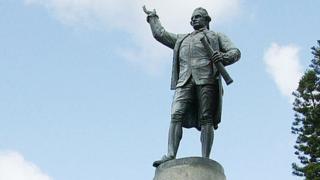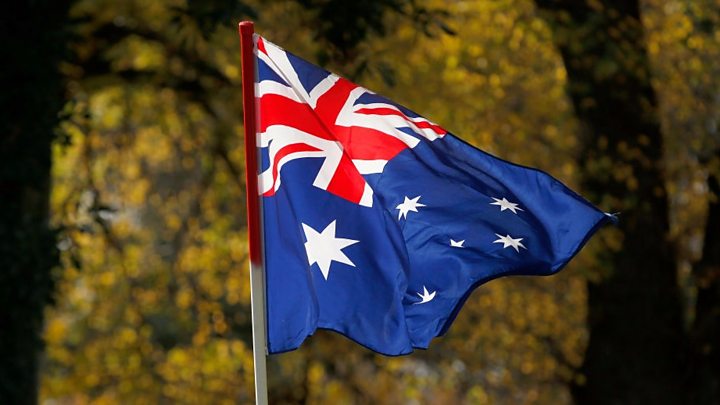[ad_1]

Image copyright
Getty Images
The inscription beneath this statue of Captain Cook in Sydney has also proved controversial
On 29 April 1770, explorer James Cook arrived in Australia. He would later claim the region for the British crown.
But celebrations in Australia for the 250th anniversary of Captain Cook’s voyage are to be a muted affair.
This is mainly down to the coronavirus lockdown but there is also rising unease over marking the “discovery” of a land already inhabited for millennia.
Captain Cook is acknowledged as one of the world’s greatest explorers but his legacy has been questioned by many.
The 200th anniversary was a very different affair, with the Queen and the Duke of Edinburgh travelling to Australia to join the celebrations.
Image copyright
Getty Images
The Queen was in Australia to mark the expedition’s 200th anniversary
What has been cancelled?
The government has been forced to shelve its A$48.7m (£25.5m; $31.7m) commemorations due to the Covid-19 pandemic.
These included a replica of the HMS Endeavour, Captain Cook’s Royal Navy vessel, circumnavigating Australia.
“As the 250th anniversary nears we want to help Australians better understand Captain Cook’s historic voyage and its legacy for exploration, science and reconciliation,” Prime Minister Scott Morrison said last year.
But the April voyage was scrapped last month amid mounting pressure due to the coronavirus. The vessel is expected to sail down the West Australian coast to Perth later in the year.
Image copyright
Getty Images
A replica of the HMS Endeavour
Other events to be cancelled or moved online include exhibitions and commemoration ceremonies.
Why is the day controversial?
It marks 250 years since Captain Cook landed on the shores of Botany Bay in modern-day eastern Sydney.
The day is seen by some as the “founding” of modern Australia but it is highly controversial – given the lack of reconciliation with indigenous people and the inequality which still exists today.
Critics say the celebrations overlook the experiences of indigenous Australians, who had lived in Australia for tens of thousands of years, while others defend the commemorations as marking part of the country’s history.
There has also been recent controversy over a statue of Captain Cook in Sydney’s central Hyde Park which has a plaque saying he “discovered this territory”.

Media playback is unsupported on your device


















